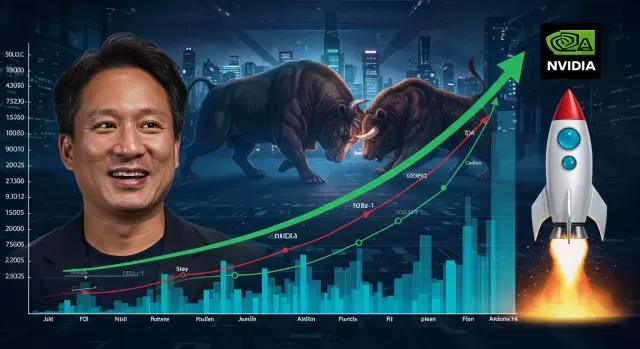Nvidia: Is the Reign Nearing an End? Insider Selling and Investor Strategy
Jul 29, 2025
Nvidia's stock is soaring, but CEO Jensen Huang's recent share sales have investors concerned.

Nvidia (NASDAQ: NVDA), the darling of the tech world, has seen its stock price skyrocket in recent years, catapulting it to the position of the world's most valuable company. However, recent news of CEO Jensen Huang selling off a significant chunk of his shares has sparked concerns among investors. Is this a signal of trouble ahead, or simply a strategic move by a seasoned executive? Let's delve into the details and examine what this means for your investment strategy.
CEO Share Sales: A Cause for Alarm?
It's natural for investors to feel uneasy when a CEO starts selling company stock. After all, insiders have the most intimate knowledge of a company's prospects. However, it's essential to understand the context before jumping to conclusions.
In Huang's case, his stock sales are part of a pre-arranged plan known as a Rule 10b5-1 plan. These plans allow insiders to sell shares at predetermined times and prices, shielding them from accusations of trading on non-public information. Huang initiated this plan in March, with the intention of selling up to 6 million shares.
Important Considerations about the Plan
- Pre-Arranged: The plan was established well in advance, mitigating concerns about reacting to current market conditions.
- Automated Execution: A designated broker executes the trades, ensuring compliance with regulations.
- Common Practice: Many executives use these plans to diversify their holdings over time.
Huang's Remaining Stake: Still Substantial
Even after selling 6 million shares, Huang will retain a significant ownership stake in Nvidia. He currently holds approximately 858 million shares, representing about 3.5% of the company's outstanding shares. This makes him the largest individual shareholder, and only a handful of institutional investors hold a larger position.
Why This Matters
- Continued Alignment: Huang's large remaining stake suggests he is still heavily invested in Nvidia's long-term success.
- Vote of Confidence: A drastic sell-off would be far more concerning than a planned, moderate reduction in holdings.
Nvidia's Strong Fundamentals: The AI Revolution Continues
Beyond the CEO's stock sales, Nvidia's underlying business remains robust. The company is a leader in the booming artificial intelligence (AI) market, with its chips powering everything from data centers to self-driving cars.
The AI Chipset Market Outlook
Grand View Research projects a compound annual growth rate (CAGR) of 28.9% for the AI chipset market through the end of the decade. Nvidia is well-positioned to capitalize on this growth, thanks to its technological leadership and strong customer relationships.
However, No Business is Without Risks.
- Valuation Concerns: Nvidia's stock is currently trading at a high premium.
- Competition: Tech giants are developing their own AI chips, potentially disrupting Nvidia's dominance.
A Look at Nvidia's Valuation and Growth Potential
| Metric | Nvidia (NVDA) | S&P 500 Average |
|---|---|---|
| Price-to-Earnings Ratio | 55 | Less than 25 |
| AI Chipset Market CAGR | 28.9% | N/A |
This table highlights the importance of considering valuation alongside growth potential. While Nvidia's growth prospects are undeniable, its high valuation means that expectations are already baked into the stock price.
Strategic Considerations for Investors
Given these factors, what should investors do with their Nvidia stock? Here are a few options to consider:
- Hold: For long-term growth investors, maintaining a position in Nvidia may still be a sensible strategy. The company's leadership in AI and its potential for future growth could deliver market-beating returns over time.
- Trim: Investors who have enjoyed substantial gains in Nvidia stock may want to consider selling a portion of their holdings to lock in profits. This can reduce risk while still maintaining exposure to the company's upside.
- Rebalance: Rebalancing your portfolio can help manage risk by ensuring that your asset allocation aligns with your investment goals. Selling some Nvidia stock could free up capital to invest in other asset classes or sectors.
The Analyst's Recommendation: Something to Consider
The Motley Fool Stock Advisor team recently identified what they believe are the 10 best stocks for investors to buy now… and Nvidia wasn't one of them.
It's important to research and consider all available information before making any investment decisions.
Proceed with Caution and Strategy
Jensen Huang's stock sales should not be a cause for panic. His actions are part of a pre-planned strategy, and he remains heavily invested in Nvidia's future. However, Nvidia's high valuation and the potential for increased competition warrant a cautious approach. Investors should carefully consider their risk tolerance, investment goals, and the current market conditions before making any decisions about their Nvidia holdings. By doing so, you can make informed choices that align with your overall financial strategy.
